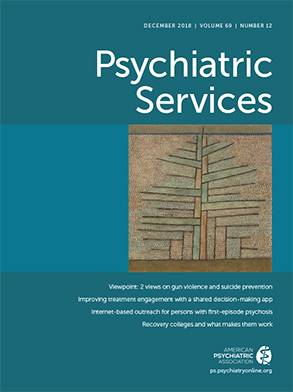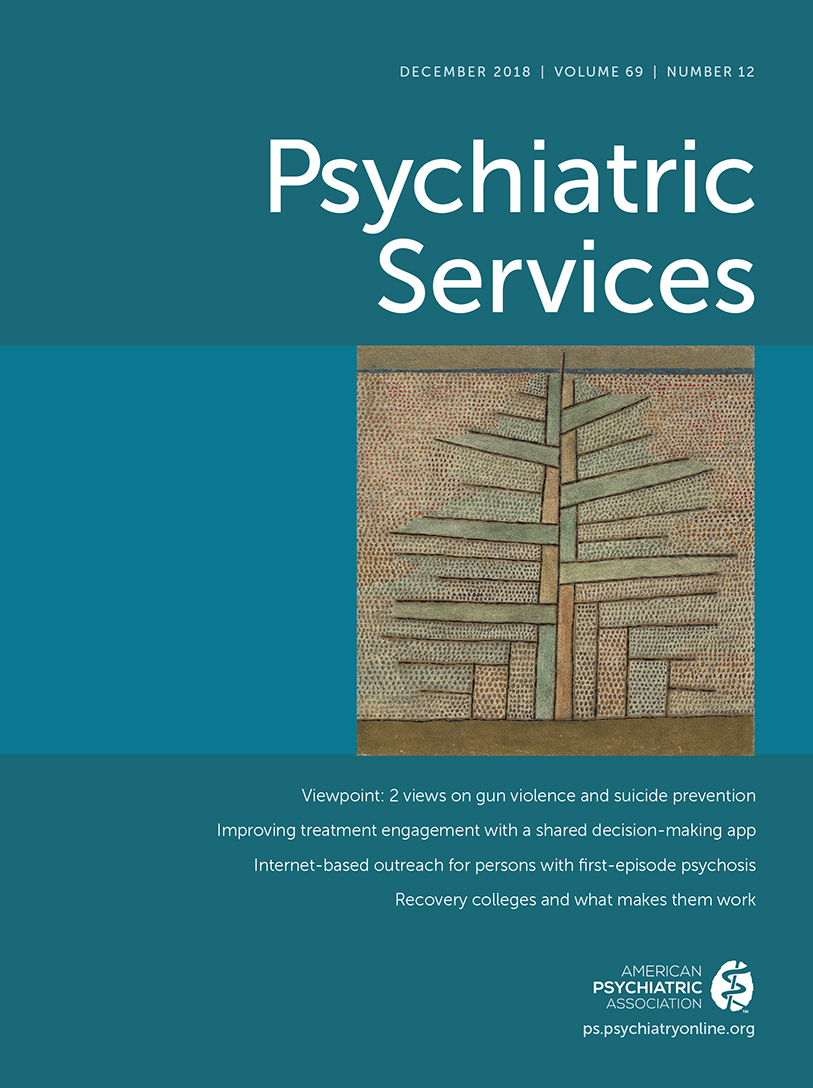In 2016, the Chinese government instituted a reward policy to encourage family care of persons with serious mental illness by providing financial incentives to the family to decrease crime and promote community safety (
1). First proposed by psychiatrists and finally accepted by the central government, the policy targets families who have incomes below the poverty line and a family member with a mental illness who is at risk of violent behavior. A person at risk of violent behavior is defined as one with serious mental illness who has committed a crime or is at high risk of doing so as judged by the public security authorities; who is rated at level III or above on the Risk Assessment Form for Persons With Serious Mental Illness, an instrument developed by the Ministry of Health (
2); and who has the probability of committing crime as judged by the local community. A level III rating includes a risk of destruction of property, violent aggression against people, self-injury, suicide, and possession of controlled objects that can be used as weapons or to cause explosions or commit arson.
According to the policy, a reward equal to the local poverty line allowance (currently at least 200 RMB) is delivered on a monthly basis, mainly as a living allowance for the family, on the condition of zero crimes or legal offenses committed by the person with serious mental illness (
1). The policy addresses family involvement in preventing persons with serious mental illness from engaging in violent behaviors and crimes and attempts to encourage family caregivers, who may have other part-time or full-time jobs, to invest more time and energy in looking after family members with serious mental illness.
Serious mental illness has been reported to be a risk factor for criminal justice involvement, ranging from misdemeanor-level crimes to life-threatening crimes, such as mass shootings (
3,
4). In China, there are more than 16 million patients with serious mental illness (
5), and for the past 15 years, the Chinese government has increased its focus on and investment in the management of serious mental illness. These initiatives include the National Continuing Management and Intervention Program for serious mental illness (also called the 686 Program), which was launched in 2004, and the national essential public health service for management and treatment of persons with serious mental illness, which was implemented in 2009. By 2014, nearly 4.3 million patients were registered in the National Information System for Serious Mental Illness, which was initiated in 2011 (
6). According to data in this system, only 35.8% of patients receive regular follow-up, 24.3% regularly take medication for their illness, and 1.3% are rated at level III or above on the Risk Assessment Form for Persons With Serious Mental Illness (
6), which leaves much room for improvement. The 2016 reward policy, with its strong financial incentives for family care of persons with serious mental illness, was introduced as a timely and powerful response to the pressing need for improvement.
One of the biggest challenges confronting the reward policy is its potential to reinforce public stigma and stereotypes against persons with serious mental illness because of the policy’s implication that they are violent. Since 2016, the policy has been fully implemented across the country, and official notices and documents about the policy have been made public, which may serve to further strengthen social stigma. Although serious mental illness has been shown to be associated with a higher risk of criminal justice involvement, the association is greatly weakened when other social factors that are strongly associated with crime are considered, such as poverty, poor education, and lack of social support (
7). Increased social stigma may contribute to negative consequences for both patients and families, including low self-esteem, low quality of life, social exclusion, social isolation, reluctance to seek proper treatment, and failure to use public health programs (
8).
In addition to increasing social stigma for persons with mental illness, the policy may also lead to substantial stigma toward family members, who may be regarded as responsible if their ill family member becomes violent. For instance, the family could be seen as not providing proper care for the ill person, especially because the family receives a financial reward to support such care. Such stigma may cause families to place illegal restrictions on the person with mental illness to prevent violent behavior, which may lead to even worse outcomes for the family and which defeats the purpose of the policy.
Another challenge is presented by the ethical issues involved in family care of persons with serious mental illness. To prevent patients from committing crimes or legal offenses, the family may take extreme measures that may violate human rights, such as illegally locking or chaining patients at home and prohibiting them from going out in order to minimize the risk of crime. This may constitute a violation of the first National Mental Health Law, which was passed in China in 2012 and which clearly states that individuals or organizations must not illegally restrict the personal freedom of persons with mental disorders (
9).
Notwithstanding the above-mentioned potential problems, the reward policy is of great significance to China’s mental health development. When the 686 Program was initiated in 2004, its purpose was to decrease crime by persons with serious mental illness, and after years of development and expansion, it has attained goals far beyond its original purpose. On the basis of the 686 Program, China has incorporated the treatment and management of serious mental illness into basic public health programs, which has benefited many patients and families. From January 2006 to April 2011, the proportion of patients with serious mental illness in stable condition increased from 67.0% to 90.7%, the rate of violations of social security regulations among persons with serious mental illness declined from 4.8% to .5%, and the crime rate in this population fell from 1.5% to 0 (
10). The new reward policy, which was implemented with a purpose similar to that of the 686 Program, may improve the well-being of both patients and families if utilized and executed properly.
As far as we know, China is the first country to implement a nationwide policy to financially reward family care of persons with serious mental illness to prevent criminal offenses. Outcomes related to implementation of this policy may encourage other countries to undertake similar initiatives, especially Asian countries that share a Confucian culture in which people with serious mental illness are mainly cared for within the family. However, caution is warranted during implementation of the policy. Because the policy does not include any measures to address social stigma or human rights violations, we propose the following steps to decrease or mitigate these problems: strengthen privacy protection during policy implementation, such as by not identifying families who receive the monthly financial award; provide free legal aid to the person with serious mental illness and the family when they encounter social stigma or human rights violations; enhance monitoring and management of family care to prevent illegal restriction of persons with serious mental illness; provide free education and training to family members in the proper care of persons with serious mental illness; and improve the mental health system to make mental health services more accessible and affordable to the community.

